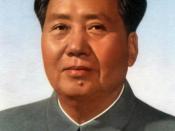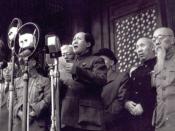'A revolution is not a dinner party, or writing an essay, or painting a picture, or doing embroidery; it cannot be so refined, so leisurely gentle, so temperate, king, courteous, restrained, and magnanimous. A revolution is an insurrection, an act of violence by which one class overthrows another.'1
- Mao Zedong
China: a land which is as delicate as the pottery that carries its name, and a land that has been ravaged by the upheavals endured throughout thousands of years. In retrospect, revolution and rotation has always been the essence of Chinese culture, from the early Hsia dynasty to the present Communist reign. Dynasties went through a predictable cycle, which started with a strong administration and ended with corruption and the loss of the so-called 'Mandate of Heaven.' In 1911, the Republic of China was born under the supervision of Sun Yat Sen. Despite the new name, the republic did not escape the age old dynastic cycle: just as it rose from the ashes of the Manchu dynasty, it eventually and almost inevitably fell to the Communists cadres and its own evils.
Out of the vacuum created by the fall of the republic under Chiang Kai-shek, emerged the Chinese Communist Party (CCP), with a young visionary at its head: Mao Zedong. Even before the declaration of the People's Republic of China in 1949, Mao was a key factor determining the events that changed the face of his country.
Was Mao Zedong a great, progressive leader? The answer to this question depends on one's conception of progression and leadership. 'Progressive' by what standards? A 'leader' in what sense? The latter question is easily answered. One of the standard definitions of a leader is 'a head of a political party or organization.'2 In this sense, Mao was indeed a leader: from the...



Mao as a leader
Your essay was very informative and indepth. I liked the quote you started your essay with and your intro. I'm glad that you have stated all your sources! Good work!
2 out of 2 people found this comment useful.